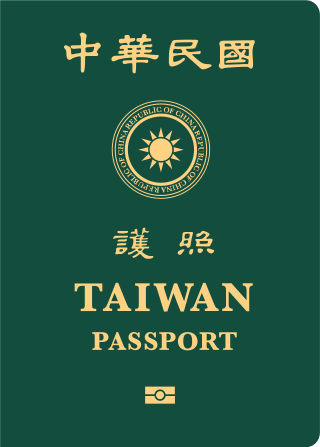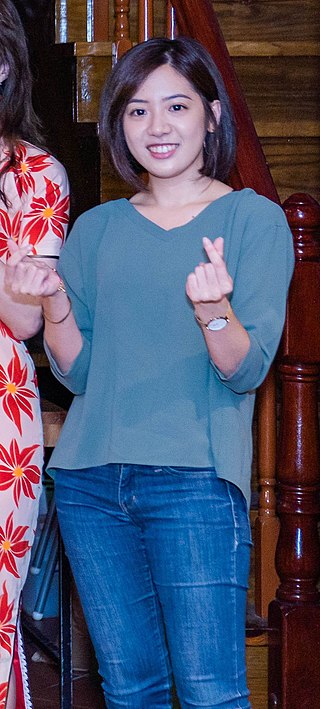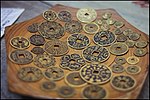
You Si-kun, also romanized Yu Shyi-kun, is a Taiwanese politician. He was one of the founding members of the Democratic Progressive Party (DPP), and is known to be a strong advocate of Taiwan independence. He led the DPP as chairman from 2006 to 2007 and served as Premier from 2002 to 2005.
In Taiwan, censorship involves the suppression of speech or public communication and raises issues of freedom of speech, which is protected by Article 11 of the Constitution of the Republic of China. There exist a number of cases where freedom of speech is restricted by the law, which include defamation, breach of privacy, infringement of copyright, pornography, incitement to commit crimes, sale of prohibited items and distribution of offensive or distributing content.

The Republic of China (Taiwan) passport is the passport issued to nationals of the Republic of China. The ROC passport is also generally referred to as a Taiwanese passport. In September 2020, approximately 60.87 percent of Taiwanese citizens possessed a valid passport. All passports published in Taiwan since 2008 have been biometric.

Chen Chu is a Taiwanese politician serving as president of the Control Yuan and chairwoman of the National Human Rights Commission since 2020. Before assuming her current post, Chen had served as Secretary-General to the President from 2018 to 2020 and Mayor of Kaohsiung from 2006 to 2018, making her the longest-serving mayor of the city since the Japanese occupation of Taiwan.

The Chien-Cheng Circle or Taipei Circle is a public plaza in Datong District, Taipei, Taiwan. Formerly it was a traffic circle, and the area used to host a bustling night market.
The Republic of China Consumer Voucher is a type of voucher issued by the government of the Republic of China in times of economic troubles. In 2009, the first series of vouchers was issued in respond to the Great Recession and a second series was issued in 2020 in response to the COVID-19 recession. The second series was issued both as physical vouchers as well as digital e-vouchers.

In economics, stimulus refers to attempts to use monetary policy or fiscal policy to stimulate the economy. Stimulus can also refer to monetary policies such as lowering interest rates and quantitative easing.
Events from the year 2009 in Taiwan, Republic of China. This year is numbered Minguo 98 according to the official Republic of China calendar.

Chao Cheng-yu is a Taiwanese politician who is a member of the Legislative Yuan for Taoyuan 6.

Huang Jong-tsun is a Taiwanese psychologist and politician who serves as the current President of the Examination Yuan. Prior to assuming his current role, Huang had served as President of China Medical University from 2005 to 2014 and Minister of Education from 2002 and 2004. He is the first President of the Examination Yuan not affiliated with any political party.
The COVID-19 pandemic in Taiwan was a part of the worldwide pandemic of coronavirus disease 2019 caused by severe acute respiratory syndrome coronavirus 2. As of 19 March 2023 in Taiwan, 10,231,343 are confirmed cases, including 18,775 deaths.

The Special Act for Prevention, Relief and Revitalization Measures for Severe Pneumonia with Novel Pathogens is a law of the Republic of China (Taiwan) regulating response and relief efforts related to the COVID-19 pandemic in Taiwan.
The Central Epidemic Command Center is an agency of the National Health Command Center (NHCC). It has been activated by the government of Taiwan for several disease outbreaks, such as the 2009 swine flu pandemic and the COVID-19 pandemic. The head of the agency is Chen Shih-chung, the minister of health and welfare. The CECC is associated with the Taiwan Centers for Disease Control.
Events from the year 2021 in Taiwan, Republic of China.
The Howard Plaza Hotel Kaohsiung is a skyscraper hotel completed in 1996 in Sinsing District, Kaohsiung, Taiwan. The roof height of the building is 356 ft (109 m), and it comprises 30 floors above ground.

Chen Su-yueh is a Taiwanese politician. She served on the Changhua County Council from 2006 to 2014, then she won a by-election and succeeded Wei Ming-ku as a member of the Legislative Yuan in 2015.
A constitutional referendum was held in Taiwan on 26 November 2022. Voters voted on adding Article 1-1 to the Additional Articles of the Constitution of the Republic of China. Had it passed, the voting age would have been lowered from 20 to 18 years. The amendment would also have lowered the minimum age of candidacy from 23 to 18 years once the relevant electoral laws had been amended accordingly.

Contact information registration is a nationwide policy in Taiwan imposed by the Centers for Disease Control (CDC) starting from May 2021 to April 2022. Contact Information registration is imposed as a part of the Taiwanese government's effort to combat the COVID-19 pandemic.

Huang Ching-yin, nicknamed Hsueh-chieh, is a councilor representing Taipei City Constituency I on the Taipei City Council. A native of Taipei and a member of the Taiwan People's Party, Huang was formerly a reporter for online news outlet ETtoday News Cloud. She was previously responsible for managing social media for former Mayor of Taipei Ko Wen-je, and served as a deputy spokesperson for the Taipei City Government. In 2020, she ran as a Taiwan People's Party candidate for legislator-at-large in the Legislative Yuan. Huang was elected to the Taipei City Council in November 2022, coming first in a field of 25 candidates for Taipei City Constituency I, which includes the northern Taipei districts of Beitou District and Huang's hometown of Shilin District.
1450 Internet army, also known as 1450, is a term for Internet users who have been hired by Taiwan's Democratic Progressive Party (DPP) to sway public opinion. In 2019, the Taiwanese Council of Agriculture budgeted NT$ 14,500,000 for public relations campaigns and the hiring of social media managers to debunk misinformation. Because what counted as misinformation was not clearly defined, some netizens questioned whether it included any and all negative coverage, coining the term "1450". After the council warned reporters not to use titles such as "Council of Agriculture funding Internet army", the term gained even greater popularity.














